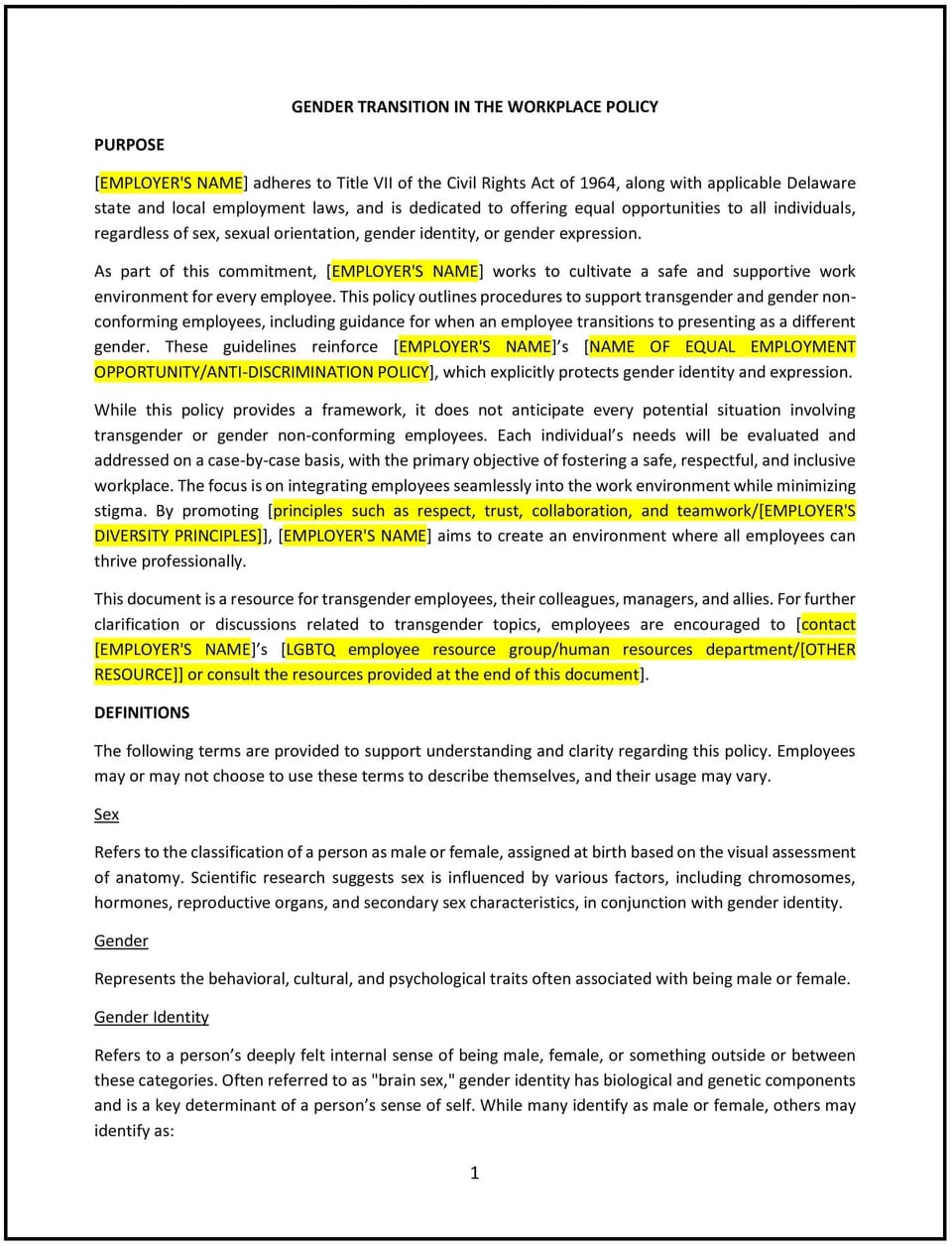Gender transition in the workplace policy (Delaware): Free template

Gender transition in the workplace policy (Delaware)
A gender transition in the workplace policy helps Delaware businesses support employees undergoing gender transition by providing clear guidelines for communication, workplace adjustments, and anti-discrimination measures. This policy ensures respect, inclusivity, and compliance with Delaware and federal laws protecting employees from discrimination based on gender identity.
By implementing this policy, businesses can create an inclusive workplace, support employees during transitions, and foster a culture of respect and equity.
How to use this gender transition in the workplace policy (Delaware)
- Establish a framework for communication: Outline steps for discussing an employee’s transition, including their preferred name, pronouns, and any workplace adjustments.
- Ensure confidentiality: Emphasize the importance of maintaining privacy and only sharing information with those the employee has approved.
- Address workplace adjustments: Provide examples of accommodations, such as updating records, adjusting dress codes, or providing access to gender-neutral restrooms.
- Train employees and managers: Offer training on gender identity, inclusivity, and anti-discrimination laws to promote understanding and respect.
- Implement anti-harassment measures: Reinforce the company’s commitment to a harassment-free workplace, with clear procedures for addressing inappropriate behavior.
- Monitor and support: Regularly check in with the transitioning employee to ensure their needs are being met and the workplace remains inclusive.
Benefits of using this gender transition in the workplace policy (Delaware)
This policy offers several benefits for Delaware businesses:
- Promotes inclusivity: Creates a supportive and respectful environment for employees undergoing gender transition.
- Enhances compliance: Aligns with Delaware and federal anti-discrimination laws, reducing legal risks.
- Improves employee morale: Demonstrates the company’s commitment to diversity and the well-being of all employees.
- Strengthens workplace culture: Fosters understanding and reduces stigma, contributing to a positive and inclusive work environment.
- Reduces turnover: Supports transitioning employees, increasing their likelihood of staying with the organization.
Tips for using this gender transition in the workplace policy (Delaware)
- Communicate the policy effectively: Ensure employees and managers are aware of the policy and its importance in fostering an inclusive workplace.
- Encourage open dialogue: Create a safe space where transitioning employees feel comfortable discussing their needs and preferences.
- Provide resources: Offer access to support groups, counseling, or external organizations specializing in gender identity and workplace inclusivity.
- Lead by example: Ensure leadership actively promotes inclusivity and models respectful behavior.
- Update regularly: Review the policy to reflect changes in Delaware laws, workplace culture, or best practices related to gender inclusivity.
Q: Why is a gender transition in the workplace policy important for my business?
A: This policy ensures compliance with anti-discrimination laws, supports transitioning employees, and fosters a respectful and inclusive workplace culture.
Q: How can my business support an employee during their transition?
A: Businesses can support transitioning employees by respecting their preferred name and pronouns, providing appropriate accommodations, and ensuring their privacy is protected.
Q: What types of accommodations might be needed for a transitioning employee?
A: Accommodations may include updating workplace records, adjusting dress codes, providing access to gender-neutral restrooms, and allowing time off for medical appointments.
Q: How does this policy address harassment or discrimination?
A: The policy includes anti-harassment measures, clear reporting procedures, and consequences for inappropriate behavior to ensure a respectful workplace.
Q: How often should this policy be reviewed?
A: This policy should be reviewed annually or whenever Delaware laws, workplace practices, or inclusivity standards change to ensure its continued effectiveness.
This article contains general legal information and does not contain legal advice. Cobrief is not a law firm or a substitute for an attorney or law firm. The law is complex and changes often. For legal advice, please ask a lawyer.


